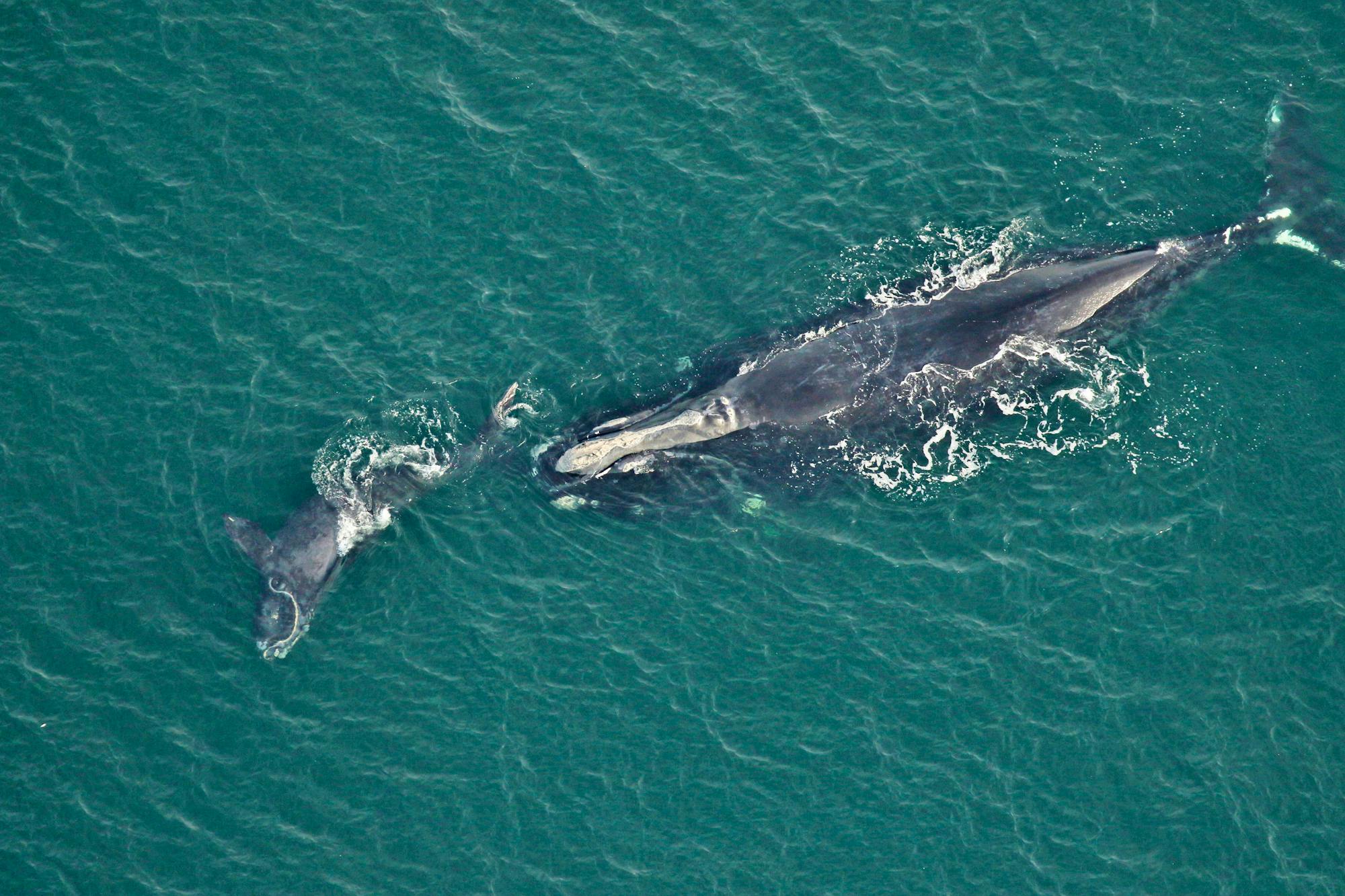Conservation groups returned to federal district court Friday to further efforts to obtain a deadline for Biden administration action on a 2022 proposed expanded vessel speed rule vital to protecting a species in crisis. A reply brief filed Friday points to the deaths of two young, critically endangered right whales from vessel strikes in the last month, emphasizing the immediate need to lift a stay in place since September 2022 so the case can proceed before this endangered species’ numbers dwindle further.
Defenders of Wildlife, Whale and Dolphin Conservation, Conservation Law Foundation and the Center for Biological Diversity filed a motion to lift the stay and requested permission to file an amended complaint in February, following the grievous wounding of a right whale calf by a vessel strike. Less than a week later, NOAA Fisheries confirmed the death of a juvenile female right whale from a vessel strike off the coast of Georgia. Last week, the wounded calf whose injuries sparked the recent wave of attention was also found dead as a result of its injuries.
“The Biden administration’s delay in finalizing an expanded vessel speed rule is directly responsible for the deaths of these two right whales on the calving grounds,” said Jane Davenport, senior attorney at Defenders of Wildlife. “Newborn calves and juveniles should not have to suffer these gruesome injuries and painful deaths that cut short not only their individual lives, but their entire species’ future.”
The North Atlantic right whale population is declining too fast for birth rates to keep up, with only around 360 whales surviving today. Vessel strikes are one of two main human-caused threats to the whale, along with fishing gear entanglements, which was also highlighted earlier this year when an entangled whale washed up on a Martha’s Vineyard beach. The vessel strike threat is currently mitigated only by a 2008 speed rule that applies to vessels 65 feet long and longer, limiting speeds to 10 nautical miles per hour in certain locations and seasons.
"Vessels slowing down can save whales and people from deadly collisions, but sadly, the only thing slowing down is progress on releasing this rule," said Regina Asmutis-Silvia, executive director of Whale and Dolphin Conservation of North America. "Politics is now outpacing entanglements and vessel strikes as the biggest threat to right whales."
Conservation groups have been vocal that seasonal management areas, determined by right whale activity when the rule was written in 2008, don’t accurately reflect the right whale’s current distribution — and that the rule doesn’t apply to enough vessels. The groups petitioned the federal government to expand the rule in 2012 and 2020, then filed suit in 2021 after the government failed to respond. When an expanded rule was proposed in August 2022, groups and the federal government reached an agreement to put the case on hold. Because of the Biden administration’s ongoing delay, the conservation groups now seek a court order setting a date for the rule to be finalized.
If finalized as proposed, the updated rule would apply to vessels starting at 35 feet in length, would establish new seasonal speed zones in line with current right whale distribution, and would require vessels to comply with temporary dynamic speed zones triggered by acoustic or visual observations.
“Right whale mothers and calves starting their journey to their feeding grounds in New England waters face a deadly gauntlet of vessel traffic,” said Erica Fuller, senior counsel at the Conservation Law Foundation. “It’s long past time for the Biden administration to finalize an expanded vessel speed rule so whales can swim safely, free of lethal ship strikes.”
“At least two young right whales have already died from apparent vessel strikes this year, making the need for an expanded speed rule tragically clear,” said Catherine Kilduff, a senior attorney at the Center for Biological Diversity. “Congress seems determined to drive North Atlantic right whales to extinction, and these poor animals can’t afford more time-wasting politicking. We know slowing vessels down even a little will help save whales’ lives. Federal officials need to make that happen before another whale is killed.”
For over 75 years, Defenders of Wildlife has remained dedicated to protecting all native animals and plants in their natural communities. With a nationwide network of nearly 2.1 million members and supporters, Defenders of Wildlife is a leading advocate for innovative solutions to safeguard our wildlife for generations to come. To learn more, please visit https://defenders.org/newsroom or follow us on X @Defenders.
News

Defenders Receives Advocacy Organization of the Year Award





